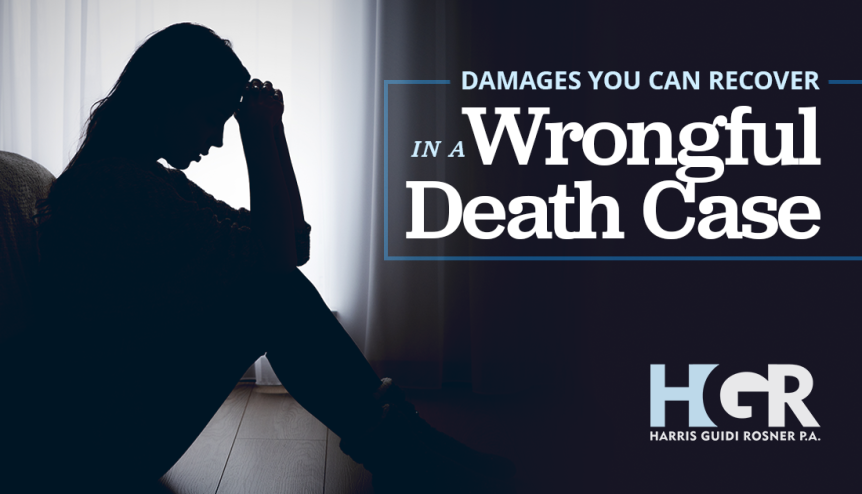Losing a loved one due to someone else’s negligence or wrongful act is devastating. In Florida, the Wrongful Death Act (Fla. Stat. § 768.16-768.26) allows surviving family members and the decedent’s estate to seek compensation for their losses. These damages can be divided into two categories: survivor damages for the family and estate damages for losses suffered by the deceased person’s estate. Understanding the types of damages available can help families pursue justice in a wrongful death case.
Who Can Recover Damages in a Wrongful Death Case?
Under Florida law, the personal representative of the deceased person’s estate must file the wrongful death claim on behalf of the survivors and the estate. Eligible survivors who can recover damages include:
- The surviving spouse
- Children (minor and, in some cases, adult children)
- Parents of the deceased
- Blood relatives and adoptive siblings who were dependent on the deceased for support or services
Types of Damages Available in a Florida Wrongful Death Case
1. Survivor Damages: Compensation for Family Members
These damages compensate surviving family members for the emotional, financial, and practical losses they endure after losing a loved one.
- Loss of Support and Services:
Survivors may recover damages for the loss of financial support and services the deceased provided. This includes income, contributions to household duties, and other forms of assistance. The amount is calculated based on the decedent’s earnings, life expectancy, and the needs of the survivors. - Loss of Companionship and Protection:
A surviving spouse may recover damages for the loss of companionship, love, and protection that the deceased provided. Similarly, minor children may seek compensation for the loss of parental guidance, affection, and instruction. - Mental Pain and Suffering:
Surviving family members, including spouses, children, and in some cases, parents, may be awarded damages for the mental anguish and emotional suffering caused by the death.- Minor children can recover for the loss of a parent’s guidance and affection.
- Parents of a deceased minor child may also recover damages for their mental pain and suffering.
- Medical and Funeral Expenses:
Survivors may be reimbursed for medical expenses incurred prior to death and reasonable funeral and burial costs.
2. Estate Damages: Compensation to the Estate
The estate may also recover damages for the losses suffered by the deceased person from the time of injury until death. These damages are typically intended to reimburse the estate and compensate for losses the deceased would have incurred had they survived.
- Loss of Earnings and Accumulated Wealth:
The estate can recover compensation for the loss of earnings from the date of injury to the date of death, including lost net accumulations that the decedent would have likely saved and left as part of their estate. - Medical and Funeral Expenses Paid by the Estate:
If the estate covers the cost of medical care or funeral expenses, it can seek reimbursement. - Conscious Pain and Suffering Before Death:
If the decedent experienced conscious pain and suffering before their death, the estate may recover damages for the period between the injury and death. These are often referred to as survival damages.
Factors That Impact Damages in a Wrongful Death Case
Several factors can influence the amount of damages awarded in a wrongful death case, including:
- The age, health, and life expectancy of the deceased.
- The earning capacity and future income potential of the deceased.
- The relationship between the deceased and the surviving family members.
- The financial dependency of the survivors on the deceased.
Limitations on Damages in Florida Wrongful Death Cases
While Florida generally allows for broad recovery in wrongful death cases, there are certain limitations:
- Medical Malpractice Cases: In wrongful death cases arising from medical malpractice, Florida law limits recovery of non-economic damages, particularly for adult children and parents of deceased adult children.
- Punitive Damages: Although rare, punitive damages may be awarded if the defendant’s actions were grossly negligent or intentional.
Conclusion: Seeking Justice Through Wrongful Death Claims
Filing a wrongful death lawsuit in Florida can help families recover financially after a tragic loss while holding the responsible party accountable. Navigating these claims can be complex, which is why it’s essential to work with an experienced personal injury attorney who understands the nuances of Florida’s wrongful death laws. If you’ve lost a loved one due to negligence or wrongful conduct, pursuing compensation can provide the financial security and closure your family deserves.
